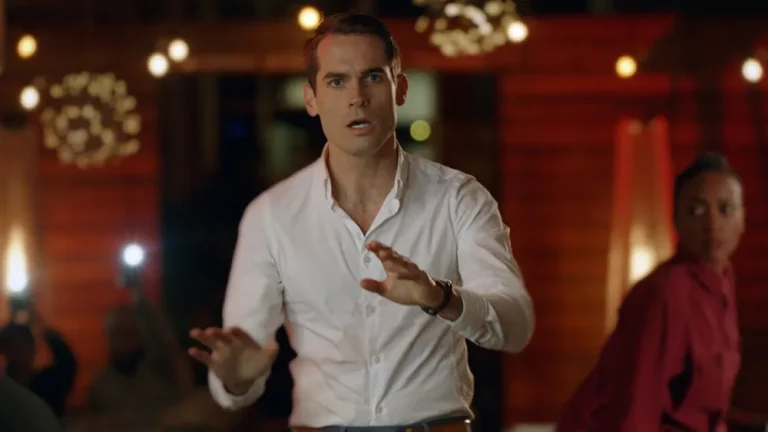When Wayward premiered on Netflix in September 2025, it stood out not just as a mystery-thriller but for the deeply personal touch of its creator and lead, Mae Martin. In this eight-episode limited series, Martin plays Alex Dempsey, a trans man and police officer who moves to the eerie town of Tall Pines with his pregnant wife and becomes enmeshed in the cryptic workings of a troubled teens’ academy.
What makes the series more than just suspense is how much of Martin’s own identity and experience subtly feed into Alex’s internal world. This isn’t just another casting or role—it’s a character born at the intersection of a time period (2003), cultural ignorance about nonbinary identity, and Martin’s ongoing journey of self.
In interviews, Martin has spoken about why writing and embodying Alex felt right, how the show gave them space to explore themes like “hypermasculinity,” and why the role required vulnerability and creative inventiveness.
In this article, we’ll first look at what Wayward is, then at Martin’s background and body of work, and finally dig into how Martin found their role as Alex in Wayward and what challenges and opportunities it offered.
Wayward on Netflix: Mystery, Identity, and Secrets
Wayward is a Canadian mystery thriller limited series that debuted on Netflix on September 25, 2025. It was created by Mae Martin (who also serves as showrunner) alongside Ryan Scott. The show brings together elements of suspense, psychological control, and identity in a fictional small town called Tall Pines.
The plot follows Alex (Martin), a newly relocated police officer, and two adolescents, Leila and Abbie, who escape the town’s controversial troubled-teens academy. Together, they unearth disturbing secrets that suggest something dark and systemic is hiding under the façade of this seemingly calm town.
The setting is circa 2003, a time before wide public awareness of nonbinary identities, which becomes relevant in how Alex experiences the world and the expectations placed on him. The show combines thriller pacing with emotional character work, and it leans into the idea that people are shaped by both the communities they join and the ideals they chase. It’s not just about solving a mystery; it’s about how identity, belonging, and the desire to conform or resist play out in everyday interactions.
Find Out More: Is Netflix’s Wayward Returning for Season 2? Here’s What We Know So Far!
Mae Martin: Background and Notable Work
View this post on Instagram
Mae Martin is a nonbinary comedian, writer, actor, and producer. They came out as nonbinary in 2021 and use they/them pronouns. Before Wayward, Martin co-created, wrote, and starred in the semi-autobiographical comedy series Feel Good. Feel Good centered on relationships, queerness, addiction, and self-discovery. Their comedy specials (e.g. SAP) and stand-up background established them as a voice unafraid to tackle identity, shame, and humor.
What’s key is that Martin has long worked in material reflecting lived experience, grappling with ambiguity and identity rather than neat labels. That perspective prepares them to handle a role like Alex, which demands nuance. Also, Martin’s earlier work shows a comfort in blending genres—comedy, drama, introspection—which translates well into Wayward’s hybrid of thriller and identity story.
Read More: Wayward (TV Mini Series 2025) Recap & Ending Explained: Does Evelyn’s Cult Break Up?
How Mae Martin Found and Shaped Their Role in Wayward
Mae Martin has described playing Alex as “juicy” precisely because the character gave them room to explore hypermasculinity in a trans context. In Deadline they reflect on how Alex is both yearning for acceptance and pulled by internal expectations of a masculine ideal. As Martin puts it:
“Alex is a character whose desperate for acceptance … he’s definitely someone who’s seduced by and yearning for that kind of heteronormative hypermasculinity and a nuclear family. So it was juicy to explore that.”
That statement shows their willingness not to present Alex as purely proud or purely victim, but someone actively negotiating what masculinity might mean to him. Martin also recalled a physical preparation that surprised them: in the process of filming, they remembered “beating the s** out of”* an actor from Kids in the Hall. That anecdote emphasizes the intensity and physical stakes the role required, beyond internal emotional labor.
They also explained why they chose to write Alex as a trans man, rather than nonbinary, especially given the show’s temporal setting. In 2003, public fluency around nonbinary identities was far lower, and the pronouns “they/them” were less widely understood. Martin said, “Playing a man just made sense to me… it felt pretty natural to me as an actor — more natural than it would’ve been to play a woman.” Through Alex, Martin crafts a character who sometimes messes up, sometimes overreaches, sometimes is unsure — and that space of uncertainty is intentional.
In Wayward, Alex carries past shadows: hints of violent behavior, struggle for control, the pull toward authority roles, and emotional fragility. Martin allowed Alex to be flawed, not idealized. They also wanted Alex to act as a kind of audience anchor — someone discovering the mysteries alongside viewers, questioning and second-guessing.
Martin’s own identity journey informs these choices. Because they live outside rigid categories, they can bring a lived awareness of tension, contradiction, and evolution into Alex. The result is a performance that feels lived-in, not merely representational.





